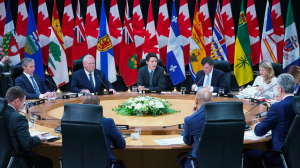To the Editor:
There’s an old adage that if something sounds too good to be true, it probably is. Such is the case with the Justin Trudeau government’s Clean Economy Investment Tax Credit plan (ITC).
On the face of it, the ITC is a reasonable approach and worthy of support. Under this plan, the government is providing companies with tax incentives of 15 to 40 per cent for capital investments in low-carbon energy generation and technology.
But here’s where the plan fails. Companies building green energy projects are required to comply with government imposed artificial wage and benefit rates of the Building Trades Unions (BTUs) in order to qualify for the full investment tax credit.
The BTUs freely admit they “leaned” on the federal government, which in turn agreed to pander to under a third of the construction labour pool. That decision will have a ripple effect across the entire construction industry.
These days, companies struggling to find workers are paying top dollar to maintain and grow their workforces. That’s how the free market works. Interfering with the market and tying tax credits to an artificial wage rate will set back ���ϳԹ���’s green energy efforts by raising project costs, discouraging investment and causing some businesses to rethink their project plans altogether.
And it gets worse. The BTUs concede that what we have now is “a complicated approvals system in which proposed projects have to be validated by Natural Resources ���ϳԹ��� and the contractual arrangements need to be vetted by ���ϳԹ��� Revenue Agency to ensure they meet the prescriptions of Bill C-59, which was passed in June 2024.”
This will just lead to more red tape. Government, which isn’t known for its efficiency, will be administering its wage and benefit rates, including overseeing company compliance across many different trades, projects and regions. More bureaucracy and higher costs are inevitable.
That’s not all. The BTUs have said the “prevailing wage for these jobs is our collective agreements, the full package, health and welfare, pension, industry funds, training funds.”
By defining the prevailing wage according to the specific details of the BTUs collective agreements, it undermines the ability for other unions to bargain in the best interests of their own members on these projects.
The BTUs see the artificial wage and benefit rates as a “monumental win” for their members. But is adding red tape to infrastructure projects, discouraging green tech investment, and undermining the basic principles of collective bargaining really a win for anybody?
At the Progressive Contractors Association of ���ϳԹ��� (PCA) our members welcome the opportunity to play a greater role in building green infrastructure in ���ϳԹ���, but this is a poor way to do it.
Paul de Jong is president and CEO of PCA. Send Letters to the Editor to editor@dailycommercialnews.com.










Recent Comments
comments for this post are closed